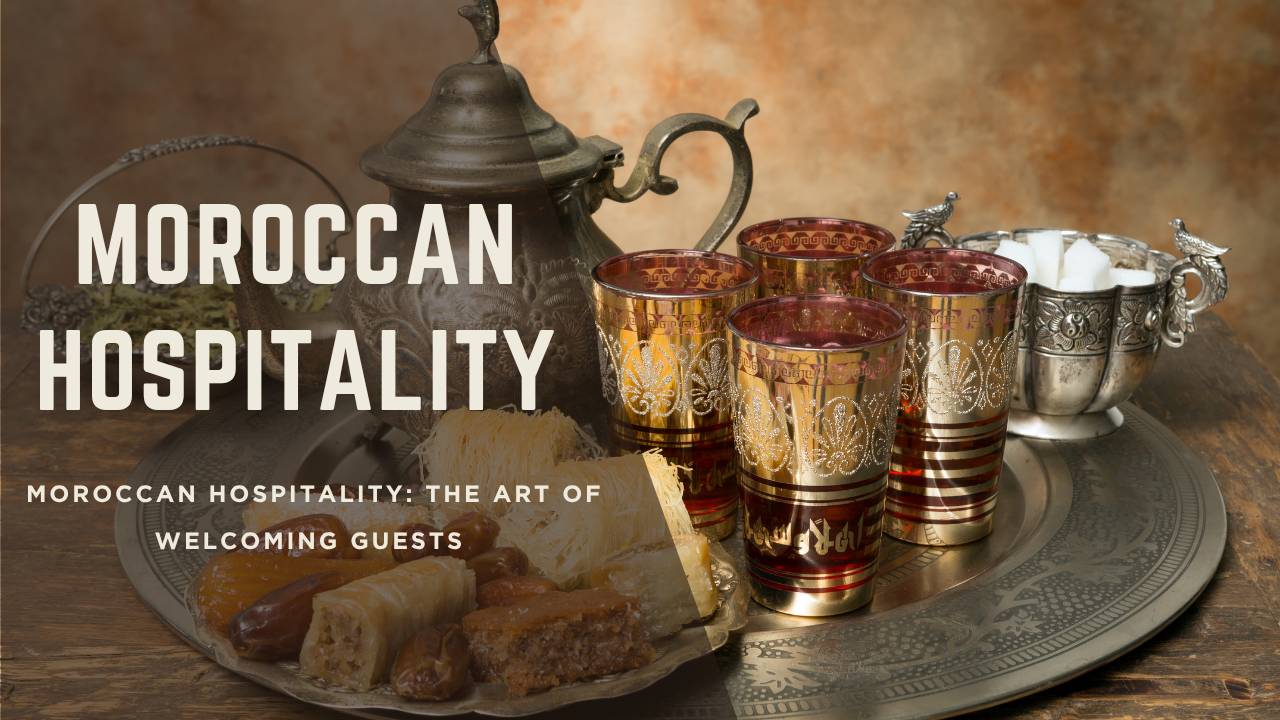Moroccan Hospitality: The Art of Welcoming Guests

Introduction
If you’ve ever visited Morocco, you’ve probably felt it right away — that warm, heartfelt welcome that makes you feel instantly at home.
In Moroccan culture, hospitality isn’t just politeness — it’s a deep-rooted tradition, an expression of generosity, and a reflection of Moroccan identity.
In this post, let’s explore the beautiful customs behind Moroccan hospitality and a few Darija expressions you can use to sound natural when visiting or hosting guests in Morocco.
1. “Mrahba!” — The Moroccan Way of Saying Welcome
The first word you’ll hear when you enter a Moroccan home is “Mrahba!” (Welcome!).
It’s more than a greeting — it’s a genuine invitation to feel comfortable and part of the family.
You might also hear:
-
“Mrahba bik!” (Welcome to you!)
-
“Dkhul, mrahba!” (Come in, you welcome!)
👉 In Morocco, when someone says Marhba, they truly mean it. Even unexpected visitors are welcomed with open arms.
2. The Famous Moroccan Tea Ceremony
No Moroccan hospitality is complete without Atay — traditional Moroccan mint tea.
It’s a symbol of friendship and warmth, and preparing it is considered an art form.
Guests are always offered tea, usually served with:
-
Fresh mint
-
Sugar (often plenty of it!)
-
Small glasses beautifully arranged on a silver tray
Serving tea shows respect and generosity. Even if you’re not thirsty, it’s polite to accept at least one glass — refusing can be seen as impolite.
Darija Tip: When offered tea, you can say:
“Shukran, bghit wahd l’kas dyal atay.” → “Thank you, I’d like a glass of tea.”
3. Sharing Food Is Sharing Heart
In Morocco, food is love — and sharing a meal is one of the most meaningful acts of hospitality.
Meals are usually served in large communal dishes, with everyone eating together using bread (khobz) instead of forks.
Common phrases you’ll hear:
-
“Bismillah!” – said before eating (In the name of God)
-
“Bsaha!” – said to someone eating (“Enjoy your meal!”)
-
“Lah ykhalik!” – polite way to thank the host
When you visit a Moroccan home, it’s normal for the host to insist that you eat more — it’s their way of showing love and care.
4. Guests Are a Blessing
There’s a Moroccan saying:
“Dyaf rahma.”
Guests bring blessings.
This reflects how deeply Moroccans value visitors.
Even in modest homes, hosts will do their best to offer something — tea, bread, fruit — to make you feel comfortable.
Hospitality is considered both a social duty and a spiritual reward.
5. The Moroccan Living Room: A Place for Guests
The salon marocain (Moroccan living room) is often the centerpiece of the home.
It’s beautifully decorated with cushions, carpets, and curtains — designed specifically to welcome guests.
Families take great pride in keeping it clean and elegant, as it’s where they receive visitors for tea, meals, or important conversations.
Useful Darija Expressions for Being a Good Guest
| English | Darija (Arabic Script + Transliteration) |
|---|---|
| Thank you | Shukran |
| Thank you very much | Shukran bezaf |
| It’s delicious! | Bnin bzaaf |
| May God bless your home | Allah ybarak f darkum |
| See you next time | Hta lmra jaya |
These small expressions go a long way when connecting with Moroccan families and locals.
The Spirit Behind Moroccan Hospitality
What makes Moroccan hospitality truly special isn’t the tea, the food, or the decor — it’s the intention.
It’s about treating others as family, creating a sense of belonging, and honoring guests as gifts from God.
Whether you’re visiting a friend, a stranger, or a family member, you’ll always feel that warmth — Marhba bik f bladna! (“Welcome to our country!”).
Learn More Darija and Moroccan Culture
At Daily Darija, we believe that learning Moroccan Arabic is also about understanding Moroccan culture.
Our lessons and courses blend language, etiquette, and traditions — so you can communicate and connect authentically.
🎯 Explore our Darija Courses: https://www.dailydarija.com/

